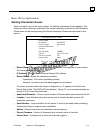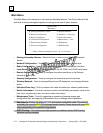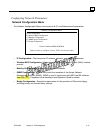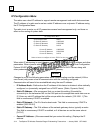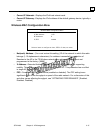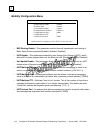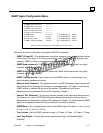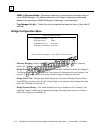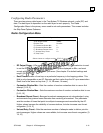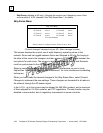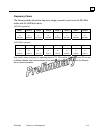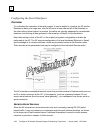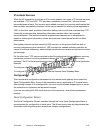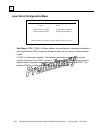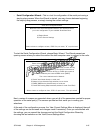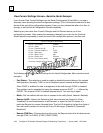
GFK-2489 Chapter 3 AP Management 3-19
3
Configuring Radio Parameters
There are two primary data layers in the TranSphere TS Wireless network—radio (RF) and
data. The data layer is dependent on the radio layer to work properly. The Radio
Configuration Menu is the primary menu used to set radio parameters. This screen includes
the Skip Zone Options Submenu.
Radio Configuration Menu
Radio Configuration Menu
A) RF Output Power 30dBm
B) Dwell Time 28 mSec
C) Contention Window Min 2
D) Contention Window Max 10
E) Broadcast Repeat Count 3
F) Unicast Retry Count 10
G) Skip Zones
Select a letter to configure an item, <ESC> for prev menu
▪
RF Output Power—(We recommend that you review this setting.) This selection is used
to set the RF output level of the transceiver. Settings are displayed in dBm, and must
comply with regulatory limitations for your area. (See chapter 2 for default settings and
range.) [20-30; 30]
▪ DwellTime—Duration of one hop on a particular frequency in the hopping pattern. This
field is only changeable on an AP; Remotes get their value from the AP upon association.
Dwell time is the same as hop time. [7, 14, 28 msec; 14 msec]
▪ Contention Window Min—Sets the number of random contention slots to use on first
attempt. [0-15; 2]
▪ Contention Window Max—Sets the maximum number of random contention slots to use.
[0-15; 10]
▪ Broadcast Repeat Count—Because broadcast messages are not acknowledged, noisy
environments may prevent some Remotes from receiving a broadcast. This parameter
sets the number of times that point-to-multipoint messages are transmitted by the AP.
Higher values increase the reliability of communications, but also increase over-the-air
congestion. [0-14; 3]
▪ Unicast Retry Count—Sets the maximum number of attempts made to deliver point-to-
point messages. Higher values are more reliable, but increase over-the-air congestion. [0-
14; 10]



